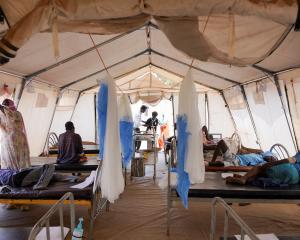If he just had the flu, why didn't they say that he just had the flu? We'd all have sent him get-well cards, and that would have been the end of it.
The lengthy and mysterious absence of Vladimir Putin ended on Monday, when the Russian President emerged in St Petersburg to greet the visiting President of Kyrgyzstan, Almazbek Atambayev.
The only explanation he offered for his 11-day disappearance from public view was that ''It would be boring without gossip''.
The rumour mill certainly went into overdrive during his absence. He had suffered a stroke.
He was in Switzerland for the birth of his child with his alleged girlfriend, gymnast Alina Kabayeva.
He'd had a facelift, or maybe just another botox job.
There had been a palace coup, perhaps connected in some way to the murder of opposition leader Boris Nemtsov last month.
All mere speculation, whose only useful function was to hold the ads apart.
The Kremlin remains, as it was in communist and Tsarist times, a place of perpetual intrigue, and Kremlinology is as imprecise a science as ever.
There are clearly rival factions struggling to influence Mr Putin's decisions, but nobody can clearly say what they want or even who belongs to which one.
Why, for example, was Mr Putin's first action after his resurrection an order to put the Russian navy on full combat readiness in the Arctic, of all places?
That's a long way from Ukraine, which is the focus of the current confrontation between Russia and the Western powers.
Is Mr Putin opening up a new front, or just demonstrating his resolve?
And if so, who is the demonstration aimed at? Nato? Some faction in the Kremlin?
Both?
The problem with an opaque regime like Mr Putin's is the difficulty in reading its motives and intentions. Even democratic governments like that of the United States can be reckless and unpredictable - consider President George W. Bush's decisions after 9/11 - but American policy is a miracle of transparency compared with the decision-making process in Moscow.
The difference is stark, and it has serious effects in the real world.
At the moment, for example, there is a major debate under way in Washington (and in other Nato capitals as well) about whether Mr Putin must now be seen as an ''expansionist'' leader who has to be stopped before he goes any farther.
The debate strongly resembles the one about Soviet intentions after World War 2, which ended in a Western decision that the Soviet Union was an expansionist power that had to be ''contained''.
The debate back then drew heavily on analogies with the rise of Hitler in the 1930s and the failure of the policy of ''appeasement'' - and the decision to surround the Soviet Union with alliances and military bases, right or wrong, led to an extremely dangerous 40-year Cold War.
Hitler has been dead for 70 years and the world is now a very different place, but here comes the same old debate again.
If you argue in Washington today that Mr Putin's actions in Ukraine are not the first step in his plan for world conquest, but just a clumsy overreaction to the overthrow of pro-Russian former president Viktor Yanukovych by the rebels in Kiev a year ago, you can be sure that various people will accuse you of being an appeaser.
If Mr Putin really is planning on world conquest - or at least on re-creating the old Soviet Union - then he has left it very late.
Hitler started grabbing territory within a couple of years of coming to power.
Apart from a little war with Georgia (which Georgia started), Mr Putin has waited 15 years to make his first move.
If he does have a plan, it's a very slow-moving one.
Besides, his strategists will be warning him that Russia could not hold up its end of a new Cold War for very long.
Russia has only half the population of the old Soviet Union, and it is now a largely de-industrialised petro-state with a GDP comparable to Italy's.
He is probably just blundering around, trying desperately to save face after his humiliation in last year's Ukrainian revolution.
Unfortunately, what goes on inside the Kremlin is so obscure nobody can be sure of his ultimate intentions.
That leaves a nice large space for the hawks in the West to play in, and they are taking full advantage of it.
But Mr Putin probably just had a bad case of flu.
• Gwynne Dyer is an independent London journalist.












